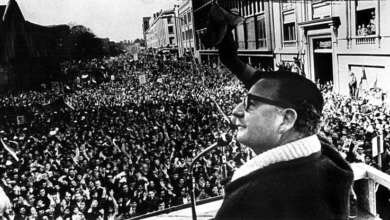On Sun. April 26, the Ecuadorian people once again chose Rafael Correa to the presidency of the republic among the eight presidential candidates. Rafael Correa won with 51 percent of the votes. With this he breaks the cycle of 10 years of uncompleted presidential terms.
Ever since Rafael Correa assumed power in Ecuador on January 15, 2007, the country has been living a process on social transformation. One of the most significant achievements was the approval of the new Constitution, which was ratified with a majority of 64 percent, on Sept. 28 last year. Thanks to the new Constitution it is possible today to elect all the existing political offices in Ecuador.

The top three candidates during these elections were Lucio Gutiérrez, Alvaro Noboa and Rafael Correa.
Lucio Gutiérrez is an ex- military, member of the Patriotic Society Party. He was president of Ecuador from January 2003 until April 2005. On April 20, 2005, Gutiérrez was overthrown as a result of what came to be known as the “Rebellion of the Forajidos”, gigantic mobilizations in Quito, Guayaquil and Cuenca against the corrupt administration of his government.
Alvaro Noboa is a leader of PRIAN, Party for Institutional Renovation and National Action. Noboa is the richest man of Ecuador. In the 2007 elections to the Constituent Assembly, he managed to become a member. However, in January 2008, he lost his post when he refused to declare his income and properties. The Noboa group controls more than 110 companies related to banana production, in Ecuador and abroad. Several of Noboa’s companies have been denounced by the Ecuadorian government for having near $27 million of unpaid taxes.
Rafael Correa, a 46 years old economist, is currently President of the Republic of Ecuador and a leader of the Citizen Revolution and PAIS Movement. He was reelected for the next four years.
The country has experienced only two years of Correa’s Citizen Revolution; nevertheless, it is the only administration in the last 15 years of political instability in the country that has made significant social changes.
In the economic area, programs of public credit that benefit the Ecuadorian countryside have reactivated agriculture. The minimum wage has risen from $170 USD to $200 USD. The government has also eliminated sub-hiring.
In social policy, the national budget has given greater importance to the areas of the education and the health.
Under Correa’s administration, illiteracy in Ecuador has decreased to 33 percent. Now, more than 2 million children receive free school texts; and, more than 1 million pupils receive free meals in their schools.
In the field of health, a significant improvement has been made in infrastructure, construction of hospitals and quality health services, without exclusions.
In addition, the government has created a bonus program called the Bonus of Human Development. It is a financial aid program subsidized by the state to the poorest families. So far, 1.3 million families receive this benefit.
Finally, it is necessary to emphasize the important gains made by this administration in regards to national sovereignty. Within the frame of the new 2008 Constitution, the presence of foreign troops in Ecuadorian territory is prohibited; consequently, the U.S. military must leave its base from city of Manta. In addition, the government has defended with dignity the Ecuadorian sovereignty in the following cases: breaking relations with Colombia as a result of the military Colombian-U.S. invasion of Ecuadorian territory on March 2008; recently expelling two U.S. diplomats; declaring a moratorium on $4 billion of foreign debt; and expelling the multinational corporations that have committed irregularities within the country.
Rafael Correa, along with Hugo Chávez of Venezuela and Evo Morales of Bolivia are leading the anti-imperialist forces in South America.






